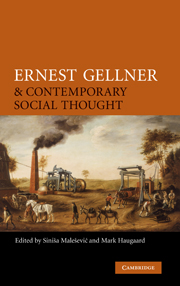Book contents
- Frontmatter
- Contents
- Notes on contributors
- Acknowledgements
- Introduction: an intellectual rebel with a cause
- Part I Civil society, coercion and liberty
- 1 Ernest Gellner on liberty and modernity
- 2 Predation and production in European imperialism
- 3 Power, modernity and liberal democracy
- 4 Gellner versus Marxism: a major concern or a fleeting affair?
- Part II Ideology, nationalism and modernity
- Part III Islam, postmodernism and Gellner's metaphysic
- Index
- References
3 - Power, modernity and liberal democracy
Published online by Cambridge University Press: 22 September 2009
- Frontmatter
- Contents
- Notes on contributors
- Acknowledgements
- Introduction: an intellectual rebel with a cause
- Part I Civil society, coercion and liberty
- 1 Ernest Gellner on liberty and modernity
- 2 Predation and production in European imperialism
- 3 Power, modernity and liberal democracy
- 4 Gellner versus Marxism: a major concern or a fleeting affair?
- Part II Ideology, nationalism and modernity
- Part III Islam, postmodernism and Gellner's metaphysic
- Index
- References
Summary
In this chapter I wish to explore the social conditions which made liberal democracy possible, arguing that Gellner's account is incomplete because his view of power was too narrow. Within Gellner's paradigm, modern political forms emerge from a process whereby ‘Production replaced Predation’ (1988: 158). Implicit in the trinitarian ‘plough, sword and book’ image, which informs this account, is the hypothesis that the realm of politics, thus power, is derived from the might of the sword. In Gellner's logic, if the norm of premodern societies is characterised by the dominance of the sword (and occasionally the book), and if it is an observed fact that modern society is not controlled by the might of the sword, the logical implication has to be dominance by one or other of the elements of this trinitarian universe. In short, the rise of one element of the trinitarian universe has to be explained in terms of the fall, or containment, of the other two. As modern societies are industrial societies, it follows that it is the plough economy that has become dominant over the others. While I agree with Gellner that modern democratic societies are historically particular in the fact that, as a routine, positions of dominance do not change hands through contests determined by the sword, it does not follow from this that the only possible explanation is containment of the sword by the plough. Gellner mistakenly assumes that the sword is the only possible basis for power.
- Type
- Chapter
- Information
- Ernest Gellner and Contemporary Social Thought , pp. 75 - 102Publisher: Cambridge University PressPrint publication year: 2007
References
- 2
- Cited by

